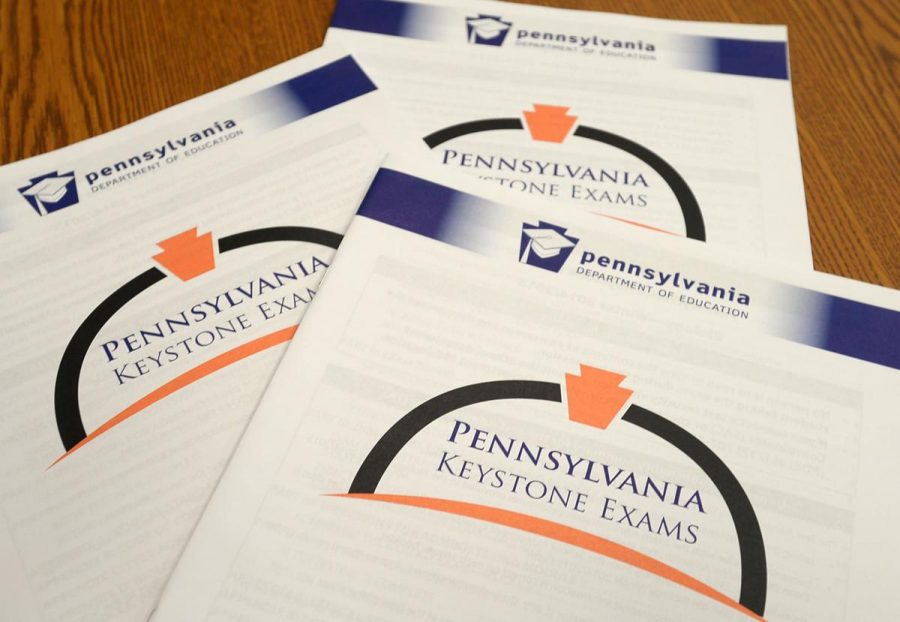Pennsylvania Department of Education Reports that Keystone Exams Are “More Valuable than the SATs”
This is satire.
January 15, 2021
In the midst of a global pandemic, the October make-up administration of Biology Keystones proved to be a productive use of the already shortened in-person instruction schedule. Unfortunately, the majority of Radnor students were rather unconvinced of this standardized test’s striking importance, and celebrated upon hearing the alternate pathways to meet the same requirement for Algebra and English. Little do they realize, the Keystones are hailed as one of the most important state mandated standardized tests. Ivy league schools such as Yale have in fact gone on the record to say the admission officers separate applications simply by Keystone scores.
However, it is possible to opt out given the fact that the test is no longer a graduation requirement. In this school year, more than ever, this option was the most appealing to concerned parents: “2020 was such a difficult and upsetting year for Radnor students due to the tragic loss of our beloved Raiders mascot and all-virtual school for the whole month of September. The last emotional weight our children needed to carry was the stress of some useless standardized test,” said an individual who had planned to opt her child out. Local adolescent therapists echoed this concern, commenting, “We must not further damage childrens’ mental and emotional health by forcing them to take an irrelevant test that harms their self esteem.”
For students and parents who do not recognize the value of the Keystones, there are a number of loopholes, described by the PA Department of Education (PDE) as ‘obstacle courses,’ they can try to take advantage of. The PDE states that there are seven pathways to meet the graduation requirement. The options that appeal the most to students are counting down from 100 in under two minutes and taking the leadership role in the freshman Biology pig dissection lab. The Department’s preferred three pathways all mention achieving a “satisfactory score” on an alternate test such as the SATs, PSATs, APs, ACTs, etc. According to the PDE, this score is up to individual school districts to decide. Radnor recently announced the school’s satisfactory score for the PSATs to be 970, after two onerous years of deciding between 970 and 975.
Nonetheless, the many opt out paths can appear quite challenging to some students, and distract from the top tier education Pennsylvania aims to provide. This education is of course built on standardized tests, and has proven to guarantee success for 47% of students in the state’s top performing public schools. When surveyed in 2019, 70% of the administrators from these schools who have worked their entire career outside of the classroom stated that they felt standardized testing was by far the easiest way to determine a student’s overall IQ and understanding of a certain topic. When asked why, one member of this group stated, “We prefer to make our teachers’ jobs as easy as possible. In terms of fairly assessing students, we eliminate the stress of grading by putting trust in a scantron to determine intelligence instead. That way, teachers do not have to carry the blame for underperforming students.”
Despite all the rave reviews of the Keystone exams by members of the PDE and additional administrators, the one question parents always ask is, “How does this standardized test ensure my child will be successful in the future?” Fortunately, the PDE was able to get in touch with those who performed in the top 60% in the 2014 Algebra and Biology Keystones and ask them about the long term effects of the exam. One senior studying at Penn State responded, “Believe it or not, many colleges focus more on Keystone scores than SAT scores. I got advanced on the Keystones, and I strongly believe that test alone is what got me into Penn State.”
While the prevalence of the Keystone exams remains questionable to a number of parents and students, the tests are noted as a hallmark of an exemplary Pennsylvania education. A member of the Department stated, “I cannot overstate the necessity of the Keystones. We’re talking about a test that is undoubtedly more valuable than the SATs.” A Radnor parent sent in similar feedback: “Taking away the Keystones is stripping away a part of Radnor’s identity, and we take pride in Radnor’s ability to accurately portray students’ IQ and predict their educational success solely through the use of a scantron.”
Many parents and administrators believe the Keystone exams are a part of who Radnor is, not just as a school, but as a community. These same individuals are determined to keep the crucial state mandated test for the “benefit of the students’ future.” Taking a step back from this raging conflict, one of Radnor’s educational priorities is made clear: tests, tests and more tests.







